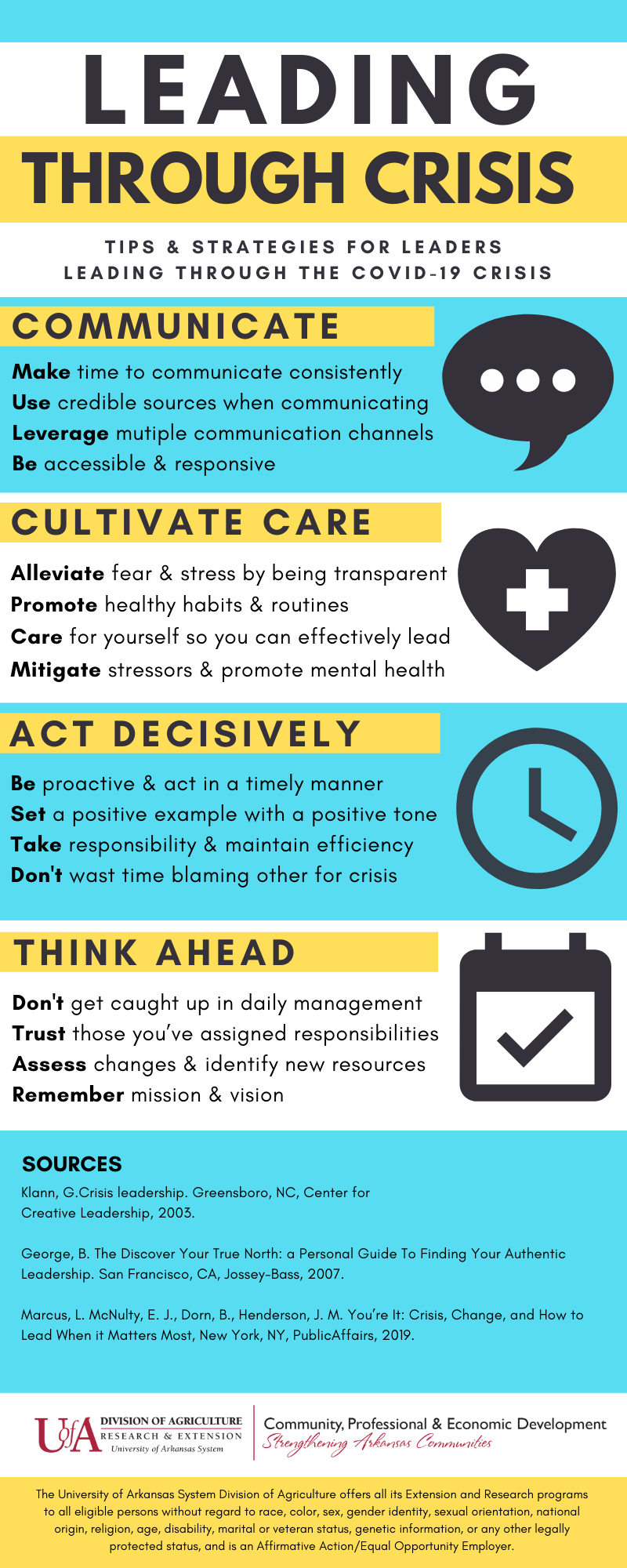April
Contact
Dr. Julie Robinson
CPED
Phone: 501-733-3101
Email: jrobinson@uada.edu
University of Arkansas System Division of Agriculture
Cooperative Extension Service
2301 S. University Avenue
Little Rock, AR 72204
Leading Through Crisis -Tips and Strategies for Leaders Guiding Others Through COVID-19
Leading during a crisis is a reality for any leader. Whether it’s a global, national, state-wide, local, or an internal crisis within your company or organization, you are going to deal with leading during and through a crisis.
We offer the following video, tips and infographic to help communicate about leading
through a crisis.
Leading Through A Crisis Video
Communicate
Make time to communicate – during a crisis you will likely communicate more often with those you lead. Make time to adequately communicate at an increased rate.
Use credible sources – use state or federal recommendations and guidelines, seek legal counsel, or advice from a trusted source. Seek credible information.
Leverage multiple communication channels – use all modes of communication to relay your messages and updates. Using different modalities will ensure that you reach every person involved.
Cultivate Spaces of Care
Care for those you lead – information is power and it’s easy to minimize concerns of others when you hold all the information. Be transparent as much as possible to reduce emotional distress and fear caused by the unknown and provide procedural guidance on how to move forward.
Self-care for yourself – in order to serve those you lead, you need to be healthy. Try to get good nights sleep, eat nutritious foods, get some physical activity, and talk to friends and family members about topics unrelated to the crisis you are facing.
Keep in mind – stress for those you lead and yourself can have physiological effects that can impact your long-term health well after the crisis is over. Try to mitigate these stressors.
Act Decisively
Be proactive – even if the crisis is fluid, you need to act in a timely manner with decisiveness.
Set the tone – as the leader, you set the tone for how those you lead reacts to the crisis. If you are positive and proactive others will be too. If you are negative and scared, you’re likely to paralyze any action or cause a mass exodus. Lead by example in the way you want others approach the crisis.
Take responsibility – even if you did not create the crisis, wasting time blaming those who did wastes time and energy needed to address the crisis at hand.
Look to the Future
Don’t revert to management – it’s easy during a crisis to revert to the comfortable day-to-day management. Continue to trust those you’ve assigned responsibilities.
Plan for the future – in the future you may need to commit resources to mitigate or allow for impacts similar to your current crisis. These resources could be structural, technological, financial, or others. There may even by organizational, cultural, or societal changes as a result of your current crisis. Keeping a pulse on these changes can impact future planning and even reveal new opportunities.
Keep an eye on the mission and vision – the crisis will take up a majority of your time, but don’t lose sight of your organizations mission and vision. Continue to make plans for the future, even if they are amended in anticipation of long-term effects of the crisis.
With any crisis there will be loss, but it can also be a time to shake things up and set into motion long-term positive change. Leaders are encouraged to communicate with those they lead, practice self-care, act decisively, and embrace the crisis as an opportunity for positive change to get those they lead through a crisis.
Find more COVID-19 resources from the University of Arkansas System Division of Agriculture here.
